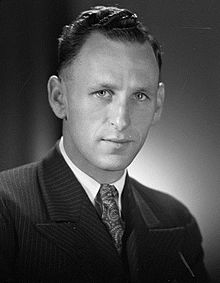Warren Freer
|
The Honourable Warren Freer QSO |
|
|---|---|
 |
|
| Member of the New Zealand Parliament for Mount Albert |
|
|
In office 1947–1981 |
|
| Preceded by | Arthur Shapton Richards |
| Succeeded by | Helen Clark |
| Personal details | |
| Born |
Warren Wilfred Freer 27 December 1920 |
| Died | 29 March 2013 (aged 92) |
| Political party | Labour Party |
Warren Wilfred Freer QSO (27 December 1920 – 29 March 2013) was a New Zealand politician and member of the Labour Party.
Freer was born in 1920. His parents were Charles and May Freer. Both lived in Waihi during the Waihi miners' strike in 1913 and had to leave the town. They married in 1914 in Remuera. As a school boy at Auckland Grammar School, Warren Freer suffered a spinal injury, and he subsequently did not join the war.
Freer stood unsuccessfully in the 1946 election for the "hopeless" (for Labour) Eden electorate. He was then asked to stand for the Mount Albert electorate in a 1947 by-election, which he won, and he then represented the Mount Albert electorate in Parliament from 1947 to 1981, when he retired, having held the seat for 34 years.
He was only 26 when he entered Parliament following the death of Arthur Richards, and was relatively unknown to Labour executive members, but local supporter Dick Barter convinced Peter Fraser that his work in Eden was adequate apprenticeship.
In 1955 he was the first Western politician to visit China, against the wishes of Labour leader Walter Nash, but with the encouragement of Prime Minister Sidney Holland.
He was succeeded by Helen Clark and then David Shearer.
...
Wikipedia
